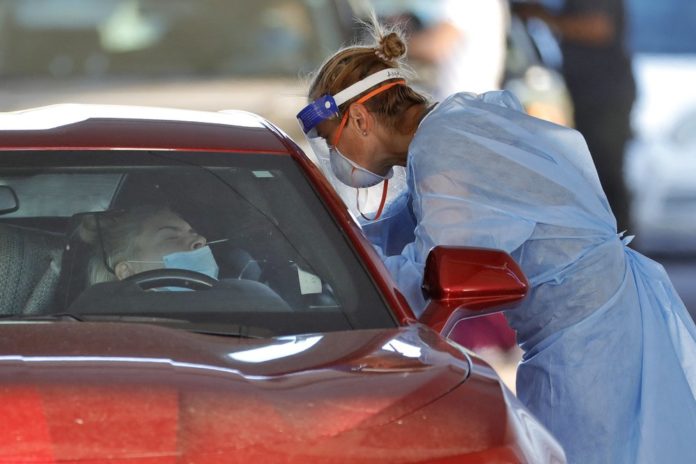
When some 45,000 coronavirus test kits went unused during a 12-day testing blitz in Phoenix’s hardest-hit Latino neighborhoods, it was clear Arizona health officials failed to adequately spread the word to a community that’s often distrustful of government.
On the last day of testing in a state that’s a national COVID-19 hot spot, just four vehicles lined up on a sweltering morning while a half-dozen uniformed members of the Arizona National Guard milled outside large white tents at a huge desert park in Phoenix.
State officials said only about 15,000 of 60,000 test kits were used at South Mountain Park and Preserve and in the western Phoenix neighborhood of Maryvale before testing ended Tuesday. It shows government officials’ limitations in promoting the availability of health care resources to communities of color during the pandemic and the hesitancy from those often most at risk from COVID-19 even if they know about those options.
“There’s a lot of lack of information from the government, a lot of chaos and a lot of false positive tests creating distrust,” said Antonio Velasquez, an evangelical pastor and Guatemalan community leader who’s recovering from the virus that hospitalized him for two days. “Many people would prefer to not get tested.”
Community leaders said many Latinos who found out about the testing events still stayed away, unnerved by uniformed military and police or the initial requests for IDs and pre-registration. Some people lack internet access to register online and those without legal status can be wary of giving their names to authorities. The National Guard was a major partner at the event, which later dropped those conditions.
Latino leaders in Arizona say they want to help, especially in Phoenix, where 43% of the population identifies as Hispanic. Latinos are disproportionately at risk for the virus because of health problems like diabetes, a tendency to live in larger groups and be employed in hospitality and other work that puts them in contact with more people.
“We’d like to partner more with the state to better educate our communities about testing opportunities and how people can better protect themselves,” said state Sen. Tony Navarrete, one of the Latino lawmakers and health care leaders who discussed the issue with Gov. Doug Ducey’s staff in a recent online conference.
Effective messaging for Latinos about the virus also has been a challenge in other U.S. communities, said Gilberto Lopez, a public health researcher for the University of California, Merced. He saw the same distrust of government while surveying Latinos in California’s Central Valley about their perceptions of COVID-19.
“The governments generally don’t really do a good job at communicating or understanding the communities they serve,” Lopez said.
The Arizona Department of Health Services, which held the testing blitz with the U.S. Department of Health and Human Services, translated materials and sent news releases to Spanish-language TV stations.
But groups close to the Latino community typically go further. Valle del Sol Community Health in Phoenix has promoted events on the social media accounts of a former Spanish-language news anchor and influencer with tens of thousands of followers. City spokesman Alejandro Montiel promotes Phoenix events in interviews on Spanish radio.
State health spokeswoman Holly Poynter said in a statement that the agency worked with community groups to share information on social media. The National Guard says the remaining tests will be used in other Arizona counties.
Tomás León, senior vice president of marketing for the private system Equality Health, said the 12-day surge event was halfway over when state officials contacted him for advice on getting more Latinos to show up.
“The state doesn’t really know how to do a lot of this,” León said. “If you don’t have credible community organizations working to help promote, you aren’t going to get far.”
He said other factors could include triple-digit heat, lag times of up to two weeks for results and concerns about nightmarish waits that his organization saw in June when as many as 1,000 people queued as long as 13 hours for free tests.
It’s often hard to keep track of the mishmash of free testing opportunities around Phoenix, with nonprofits or other groups pairing with the county or cities for a few days or weekends to take advantage of federal money allocated for COVID-19 tests.
As the state prepared to close its South Mountain event, the nonprofit HeroZona was opening a free testing location miles away in the majority Latino and Black neighborhood of Laveen. Just two dozen cars lined up at Cesar Chavez Park for tests.
Tim Herrera said he heard about the free testing on English-language TV news.
“I was expecting much longer lines,” said the 68-year-old, who didn’t have symptoms but wanted peace of mind.
Meanwhile, officials in northern Arizona have been operating a centralized testing site at a park in the forested city of Flagstaff, which has made it easier for Latinos and others to get free tests. There are audio translation services in Spanish and Navajo — for those from the nearby Navajo Nation — and video for sign language. IDs and pre-registration aren’t required.
Coconino County officials said communicating with the diverse population is a priority for the only county public health agency performing its own COVID-19 tests in Arizona. Everyone who shows up gets a test, about 10% of whom come from elsewhere, county spokeswoman Claire Harper said.
County officials learned the importance of cultural sensitivities in messaging while giving information about wildfires, Board of Supervisors Chairwoman Liz Archuleta said.
“It’s very important for me that we get everything out in Spanish and that it’s not an afterthought, that it is intentional and simultaneous,” she said. “And we want everyone — and I mean everyone — to be tested. This, for me, is public service and the role of government.”
Republished with the permission of the Associated Press.














